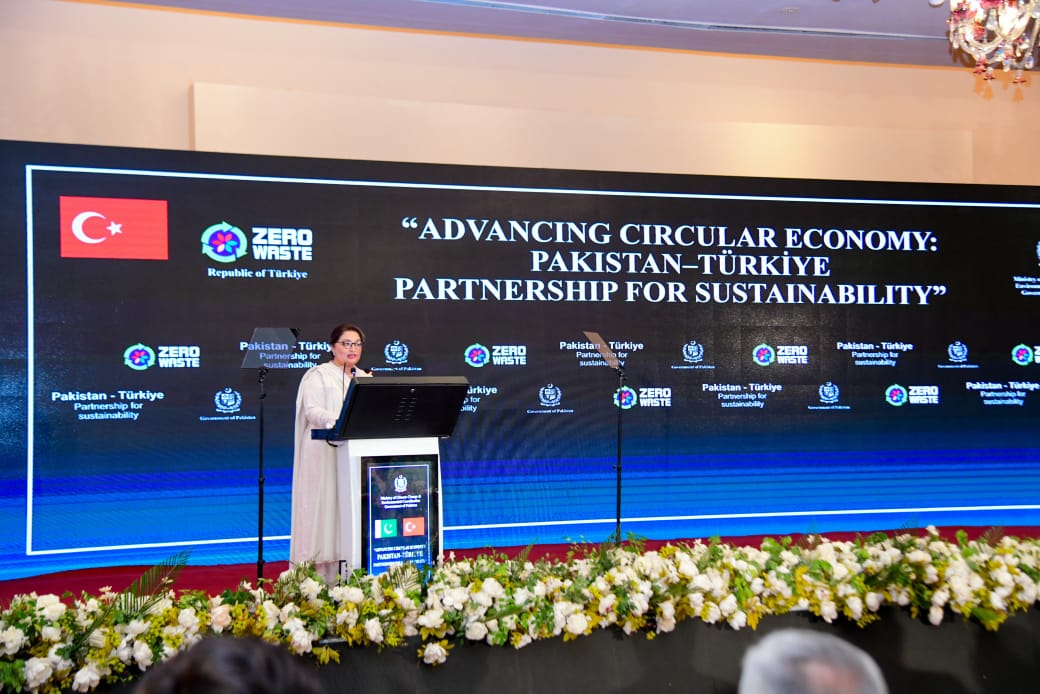WNAM REPORT: Coordinator to the Prime Minister for Climate Change, Romina Khurshid Alam has highlighted Pakistan’s ongoing efforts to improve its waste management systems and promote sustainability through the development of a Circular Economy Policy. This policy aims to incorporate circular economy principles into national strategies, fostering sustainable industrial practices and the adoption of green technologies.
At the event “Advancing Circular Economy: Pakistan–Türkiye Partnership for Sustainability,” Ms. Romina emphasized the critical nature of the challenge, noting that Pakistan has already made significant strides in tackling plastic pollution. “Pakistan has successfully implemented a ban on single-use plastics and polythene bags, which is a major achievement,” she remarked.
The circular economy model seeks to minimize waste and maximize the use of existing resources, creating a sustainable system where materials and products are continually reused. This approach supports the conservation of natural resources, reduces waste, and lessens environmental impact.
Ms. Romina added that the ban on single-use plastics has resulted in a reduction of plastic bag usage from 80% to 58%. However, she pointed out that enforcement challenges persist due to limited capacity, calling for additional measures such as consumer education and the provision of alternatives.
Pakistan generates around 49.6 million tons of solid waste annually, with a yearly increase of over 2.4%. The country faces significant waste management infrastructure challenges, which contribute to serious environmental concerns.
Ms. Romina acknowledged Pakistan’s environmental hurdles, including pollution, waste management issues, and resource depletion. She emphasized that transitioning to a circular economy could lead to substantial environmental benefits, such as waste reduction and resource conservation. However, she noted that achieving true environmental sustainability remains a long-term goal. “We are committed to advancing this agenda through innovative policies, improved recycling systems, and better waste management practices,” she affirmed.
Ms. Alam also highlighted that Pakistan is the first South Asian country to launch the World Economic Forum’s Global Plastic Action Partnership programme to combat plastic pollution, beginning with a pilot project in Islamabad to ban plastic bags and reduction the production of 600,000 kilograms of plastic annually.
She stressed the importance of private sector involvement in reducing inorganic waste and ensuring the safe disposal of industrial waste. A comprehensive national data management system, integrated with provincial and district governments, is vital for effective waste management.
Ms. Alam outlined that one of Pakistan’s key priorities is improving waste management, particularly addressing plastic pollution and the absence of waste segregation at the source. She emphasized that adopting circular economy principles—reduce, reuse, and recycle—is crucial for overcoming the nation’s waste management challenges.
Additionally, Ms. Alam commended the partnership between Pakistan and Türkiye, noting the immense potential for cooperation. “Türkiye’s Zero Waste initiative, led by H.E. Emine Erdoğan, has achieved remarkable successes, including significantly boosting recycling rates, reducing waste, and promoting sustainable practices across various sectors.”
Despite the challenges, Ms. Alam reaffirmed Pakistan’s commitment to multilateralism and the principles of the United Nations Framework Convention on Climate Change. “We adhere to the principles of Common but Differentiated Responsibilities and Respective Capabilities, equity, and climate justice, aligning our climate ambitions with the 1.5°C target set in the Paris Agreement,” she stated.
Ms. Alam also expressed her appreciation for Türkiye’s support, saying, “We are deeply grateful for Türkiye’s assistance in sharing its best practices with Pakistan. The provision of advanced equipment for waste treatment, segregation, and composting underscores the solidarity between our nations. This will significantly strengthen Pakistan’s capacity to tackle its waste management challenges and marks a new chapter in our bilateral cooperation.”
Ms. Alam extended her heartfelt thanks to Her Excellency, Emine Erdoğan, for her exceptional leadership and unwavering dedication to environmental protection. “Your efforts serve as an inspiring model for Pakistan as we navigate our path toward sustainability,” she concluded.


